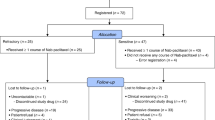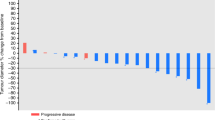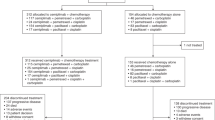Abstract
A phase II study was designed to evaluate objective response rate and toxicity of fotemustine as single-drug chemotherapy in non-small-cell lung cancer. Eighty-seven patients with unresectable non-small-cell lung cancer took part in the study. Seventy-seven were evaluable for response. Of these, 60% had received prior chemotherapy and 74% had metastatic disease. Moreover, 22 patients had central nervous system metastases (of whom 12 were evaluable for this site). Treatment consisted of fotemustine 100 mg m-2 administered on days 1 and 8 followed by a 5 week rest period. Afterwards, responding or stabilised patients received fotemustine 100 mg m-2 every 3 weeks as a maintenance therapy. Toxicity and quality of life were recorded during therapy. Thirteen patients (17%; 95% CI 9-25%) had an objective response (11% for pretreated, 26% for non-pretreated) with a median duration of 22 weeks (range 7-41 weeks). Two objective responses were observed among the 12 patients with evaluable brain metastases. No response was observed among the 14 patients with adenocarcinoma. Haematological, gastrointestinal, hepatic and renal toxicities were mild to moderate and manageable. The most frequent biological adverse reactions were delayed thrombocytopenia and neutropenia. Quality of life did not significantly decrease during the first 6 treatment weeks. Moreover, it remained stable during the study period in patients with response or stabilisation, whereas it significantly decreased in patients who experienced progression of the disease. Fotemustine is feasible for single-drug chemotherapy in non-small-cell lung cancer even though poor prognostic variables such as brain metastases are present. It can be administered on an outpatient basis and toxicity is moderate and manageable. Thus, fotemustine can be considered as a putative drug in further combinations.
This is a preview of subscription content, access via your institution
Access options
Subscribe to this journal
Receive 24 print issues and online access
$259.00 per year
only $10.79 per issue
Buy this article
- Purchase on Springer Link
- Instant access to full article PDF
Prices may be subject to local taxes which are calculated during checkout
Similar content being viewed by others
Author information
Authors and Affiliations
Rights and permissions
About this article
Cite this article
Pujol, JL., Monnier, A., Berille, J. et al. Phase II study of nitrosourea fotemustine as single-drug chemotherapy in poor-prognosis non-small-cell lung cancer. Br J Cancer 69, 1136–1140 (1994). https://doi.org/10.1038/bjc.1994.223
Issue Date:
DOI: https://doi.org/10.1038/bjc.1994.223
This article is cited by
-
Phase II study of gemcitabine and vindesine in patients with previously untreated non-resectable non-small-cell lung cancer
British Journal of Cancer (1999)
-
Evaluation of quality of life for diverse patient populations
Breast Cancer Research and Treatment (1996)



